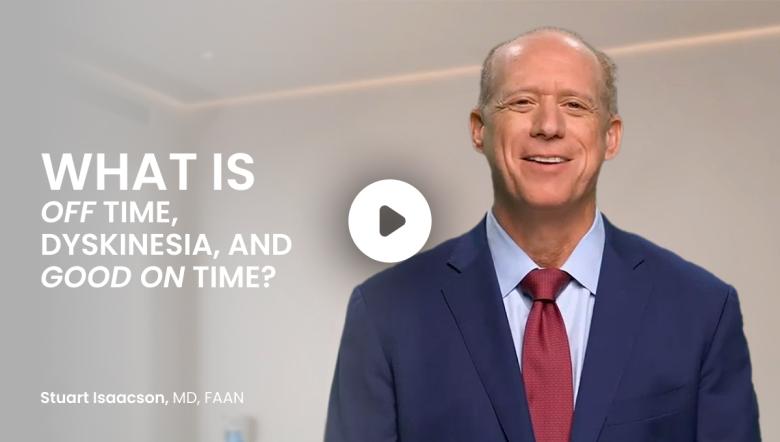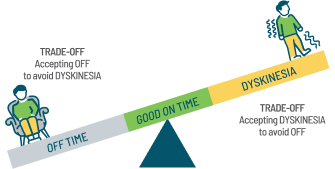Dyskinesia & OFF time
Levodopa can become less effective as Parkinson's progresses, so your healthcare provider may adjust your dosage. This adjustment may help with your OFF time symptoms, but it may also lead to more dyskinesia.
The trade-off: People with Parkinson's may have to accept living with either OFF time or dyskinesia
OFF TIME
Levodopa may not be working as expected to control Parkinson's symptoms
- Slowed movement
- Tremor, rigidity, and balance issues
DYSKINESIA
Unwanted movements that can be caused by too much levodopa and/or other Parkinson's disease (PD) medications
- Rapid jerking or muscle spasms
- Rhythmic, dance-like movements
GOOD ON TIME
- No OFF episodes or dyskinesia
- Good movement control
Do you experience tremor and/or dyskinesia throughout your day?
Tremor is a motor symptom of PD that may occur during periods of OFF time. It generally happens when a person isn't moving and appears as a rhythmic, back-and-forth movement.
Dyskinesia is mostly a side effect of levodopa and/or other PD medications. It can range in appearance from writhing, disorderly movements to rocking or bobbing movements.
Does dyskinesia or OFF time disrupt your daily activities?
If any of these have been affected by your motor complications, it may be time to talk to your healthcare provider.
90% of people with Parkinson’s experience dyskinesia after 10 years of taking levodopa.
Kendall hadn’t heard of dyskinesia when he first started experiencing it. Listen as he shares how GOCOVRI helped him and how important it is to recognize dyskinesia early and talk to a doctor about it.
Questions to consider asking your healthcare provider at your next appointment:
I sometimes experience involuntary, erratic, writhing movements of the face, arms, legs, or trunk. Could this be dyskinesia?
Will adjusting my levodopa dose cause more OFF time? What else can be done?
Is what I'm experiencing tremor or dyskinesia? What's the difference?
Dyskinesia and/or OFF time are interfering with my daily activities. What are my treatment options? Could GOCOVRI be right for me?
Tip: Our Conversation Starter can help your healthcare provider get a sense of how
you experience OFF time and dyskinesia. Fill it out and bring it to your next appointment.
Why GOCOVRI?
GOCOVRI is the only medication proven to reduce both dyskinesia and OFF time, providing more GOOD ON time. Just 1 nightly dose offers all-day coverage.
Join our email list
Sign up to receive tips and resources on how to better manage your condition while taking GOCOVRI.
 gocovri.com
gocovri.com








